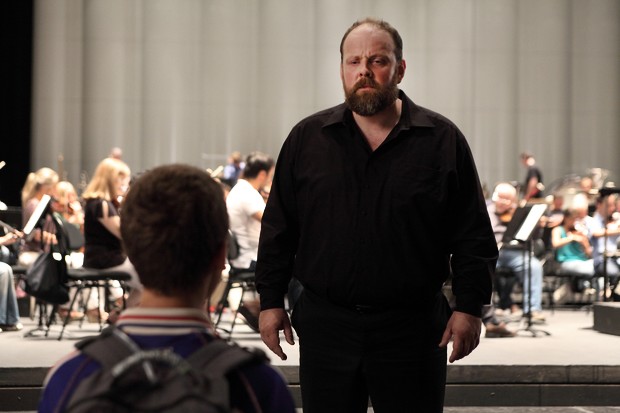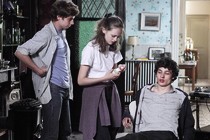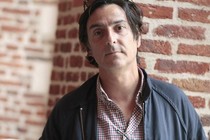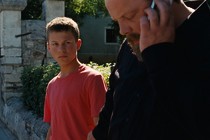The Last Hammer Blow, but a gentle one
- VENICE 2014: The second feature film by Alix Delaporte, which follows a 14-year-old boy who fears losing his mother and finds his father, is overwhelmingly moving

In her second feature film, The Last Hammer Blow [+see also:
trailer
film profile], in competition at the 71st Venice Film Festival, Alix Delaporte recovers her discreet and elegant manner of gently and naturally connecting the deeply emotional human ties that characterised Angèle and Tony [+see also:
trailer
film profile] (2010). The din of the title is misleading: it hides a truly poignant story.
The love which Delaporte describes here is filial. The main character of the movie, Victor, is a 14-year-old boy, on the verge of adolescence, who lives alone with his frail mother (Clothilde Hesme) in a trailer park beside a sparkling sea. One day when he returns home from football training (he’s captain of his team), his mother tells him that she wants to stop her cancer treatment and to go live with her parents with him. Victor, determined to battle against all the odds with the energy that his mother no longer has, decides to go meet his father, a famous orchestra conductor (Grégory Gadebois) who happens to be in Montpellier conducting Mahler’s Sixth Symphony; the film takes its title from this piece of music. This large man is not very easy-going, and the appearance of this child whom he doesn’t know at the opera, in the middle of the recital, seems to annoy him more than anything. Nonetheless, as the movie progresses, in part through music, a real father-son relationship will naturally develop between the boy and the man, without batting an eye and without any phyiscial contact – causing the already strong relationship between Victor and his mum to evolve at the same time.
The film’s strength is that it never forces anything, the characters are free to determine their own trajectories; it’s as if Alix Delaporte wanted to allow them to forge their own paths. The director has an incredible way of displaying in-depth their complex and mixed emotions, between the mother who is tempted to give in to her illness and is worried about what will happen to her child once she’s gone, without really wanting to tell him, the surly father who tries to get rid of Victor by giving him a cheque then gives him two different interpretations of a symphony so that he will come back to let him know what he thinks of them, and finally this extraordinary little man (played with overwhelming intelligence and reserve by Romain Paul), who wants to help but is well aware of his powerlessness (although he has passion and clearly feels it none of the people surrounding him deserves to be the target of that rage – not his sick mother, nor the young Spanish neighbour who helps him with his homework), and with the look of someone whom nothing escapes, but who always remains tight-lipped.
Here, facial expressions say more than words, as highlighted by the incredibly beautiful scene in which the camera scans the orchestra and where, one by one, we see the musicians take their eyes off their instruments and raise them towards the audience (to the conductor, as well as Victor, who’s beside him). Likewise, it’s enough to see father and son standing side by side, and mother and son lying down side by side, for everything to be said without a single word being spoken. Looks almost replace gestures. The first discreet, pure gesture, an expression of modest affection heightens the effect of the moments in which the characters have physical contact – like in the fantastic scene in which Victor shaves his head, and the one in which he helps the conductor to polish his concert attire. Similarly, when finally, on the face of this ever serious little boy, a smile appears, everything’s aglow.
(Translated from French)
Did you enjoy reading this article? Please subscribe to our newsletter to receive more stories like this directly in your inbox.

























